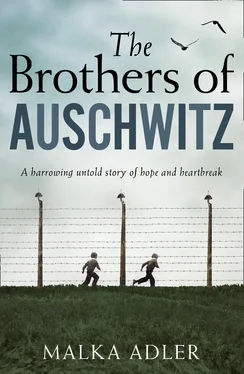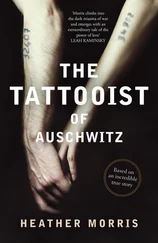Ah. The Beit Yehoshua platform is the closest thing to the platforms at Auschwitz. This is what the cashier tells us and we fall silent. At Auschwitz he touched his family for the last time. That’s what Yitzhak would say, and he’d raise his hat and shout, why should Jews stand on platforms at all? Are there no buses? Sometimes you have to stand on a bus, well, a taxi then. Taxis are expensive. So what, he refuses to stand on the platforms. Dov would cough if he heard Yitzhak getting mad about something. Then Dov would be silent. I’d pay no attention. I’d look first at Yitzhak, then at Dov and turn on the tape. Yitzhak would say loudly, why do you stand on the platforms, why don’t you take a taxi, too. Yes.
Now the eucalyptus trees are still. And the cashier is telling someone about Yajec. She has to talk fast before the new person shouts at Yajec. Every Friday the cashier protects him. Every Friday there are people who don’t know about him, haven’t heard him despair. The cashier has heard him and tells the older people so they won’t bother him. Leave him alone to kill with his umbrella, pew. Pew. Pew. Pew-pew. Once she told some new people, leave him alone, leave him be. Yajec was a little boy when he grabbed his mother’s dress, crying, yes. He wept incessantly, screamed, don’t leave me, but poor woman, she pushed him towards the group of men, and he ran to her, Mama, take me, but poor woman, she didn’t. Looking at her child, her face white, she screamed in his ear, Yajec you aren’t staying with me, go over there, you hear? And she slapped him and pushed him fiercely. You heard me. Yes. She went with the women and he stayed with strangers who didn’t see him because he was seven or eight, yes.
The train entered the station and stopped. Quiet. Three minutes of quiet. Even the cashier doesn’t speak when the train stops. She doesn’t want people to get confused. Whoever has to, boards the train, whoever has to get off – gets off. The train leaves, and the cashier said that Yajec’s father disappeared too. And his grandfather, grandmother, four sisters, and Aunt Serena and Uncle Abraham.
The face of an Ethiopian woman tugs at my belly. A gentle, fragile face, her mouth stretched outward as if she was about to weep, her eyes dark with sadness, a sadness from another place, distant, a sadness arranged in layers according to height, on her forehead a fresh, upper layer, her face strong. If Yitzhak and Dov were here, that face would probably make them weep. But Yitzhak never visits anyone and no one visits him. If Dov came, he’d probably give her a cookie and juice, tell her to sit down, sit down on a bench and rest a while.
Another train pulls in. The platform empties, only the man in the long coat and the beret are left. The Ethiopian woman boards the train. She knows there’ll be pushing but she gets on. The cashier said she was also a regular on the train. She was going to get a telling-off from the head teacher of the boarding school. That daughter of hers has behavior issues morning and night. She makes the teachers mad; wants to go back to Ethiopia; wants to live among her people; runs off to town on a Friday night, fools around at a Reggae Club. All she wants is to rap. She goes off in a long skirt and a long-sleeved blouse. In her bag she hides a small pair of shorts and a short, colorful blouse that shows her belly. She doesn’t want to be in boarding school, doesn’t want to! Her mother shouts, you are not coming back with me, you’re staying, understand?
Yitzhak would say, she’ll get used to it, in the end she’ll get used to it, and why does her mother get on the train every Friday, once every two or three months is enough, and she can go by taxi, didn’t they tell her? Dov would say, why insist with kids, it never works, best take her home, that’s all, right?
A white sun pushes through a narrow crack. It peeps out from behind the backs of the eucalyptus trees, creating a huge, shining kaleidoscope. The loudspeaker announces: attention, attention. The sun disappears. The train leaves the station.
I’m on my way to Nahariya.
Yitzhak won’t receive me. He might. On the telephone, Yitzhak said – we’ll see. Yitzhak has no patience.
Dov will sit with me. Dov keeps his word. Yitzhak too. But Yitzhak makes no promises. Yitzhak says – call on Thursday and we’ll see.
I call every Thursday, and he says, we’ll see. Finally, he says, yes, you can come.
Dov waits at the station with the car. Dov takes me to Yitzhak.
I’m not certain of anything. Will they agree to talk to me? Come again once or twice and we’ll see. That’s how they talk on the phone.
No “we’ll see”. They must.
Right.
Will you let me tell your story?
We will. We will.
We’ll take it slowly, slowly.
Maybe quickly, in case we regret it, ha. Ha. Ha.
Separately or together?
However it works out, but I have a cow farm to deal with.
So more often with Dov.
Sure. I’m willing to talk to you whenever you want.
Only on rainy days, come when it rains.
Okay, Yitzhak.
I can’t leave the cow farm in the middle of the day.
No need.
I have to feed all the calves, and I also go away sometimes.
I’ll come when it rains.
That would be best, I’m only home when it rains.
So when it rains.
All right.
But call first, and we’ll see.
I am Yitzhak: The State of Israel gave me the name Yitzhak.
The Nazis gave me the number 55484.
The goyim gave me the name Ichco.
My Jewish people gave me the name Icho.
The hardest thing of all was being evicted from our home.
We woke as usual. I got up first and wanted to go with father to the market.
I forgot it was a holiday. Father came back from the synagogue. He was black-haired, medium height. Even with his coat on, he looked thin. Father sat down on a chair. Called us. Leah, come here. Sarah. Avrum. Dov, call Icho as well. We gathered around father.
Father’s face was the color of tin in the sun. Sickly. Our eyes looked for mother.
Father said, we have to pack. We’re leaving the village. We jumped, what? Where are we going, where, don’t know, the Hungarians are sending us away from here. Where, father, where. They didn’t say, we have to be quick, pack some clothes and blankets, he coughed. Leah, a glass of water please, take some cutlery, a few plates, socks, don’t forget socks, father, where are they sending us, where, asked Avrum.
To die! said Dov. Enough, Dov, enough, they’re sending all the Jews in the village somewhere else, to the east, to work in the east. Why are they only sending Jews, asked Sarah. So we’ll die and they’ll finally be rid of us, get us out of their lives once and for all, don’t you understand?
Father covered his face with thick, dark, strong fingers.
I heard the sound of choked weeping. We looked for mother. Mother was tiny with brown hair and a gentle face, like a flower wary of the sun. Mother was chewing on the fingers of both hands. I told her, tell father to explain to us, I don’t understand, tell him, tell him. Mother sat down on a chair. At a distance from father. She was silent. Father rubbed his face as if wanting to peel off his skin and ordered: Enough! And then he got up, stretched, held onto the chair, his fingers white, almost bloodless. He looked at mother, saying hoarsely: Hungarian soldiers came to the synagogue with rifles. They told us to prepare for eviction from the house. They said within the hour. They said only to pack a suitcase with what we need. They said to go to the synagogue. To wait. Orders will come.
We shouted in unison, but father, the war is over, we can hear the Russian cannons in the distance, tell them the war is over. Father said faintly: They know. Avrum shouted, so why are they taking us, father, what do they want to do to us, what?
Читать дальше












